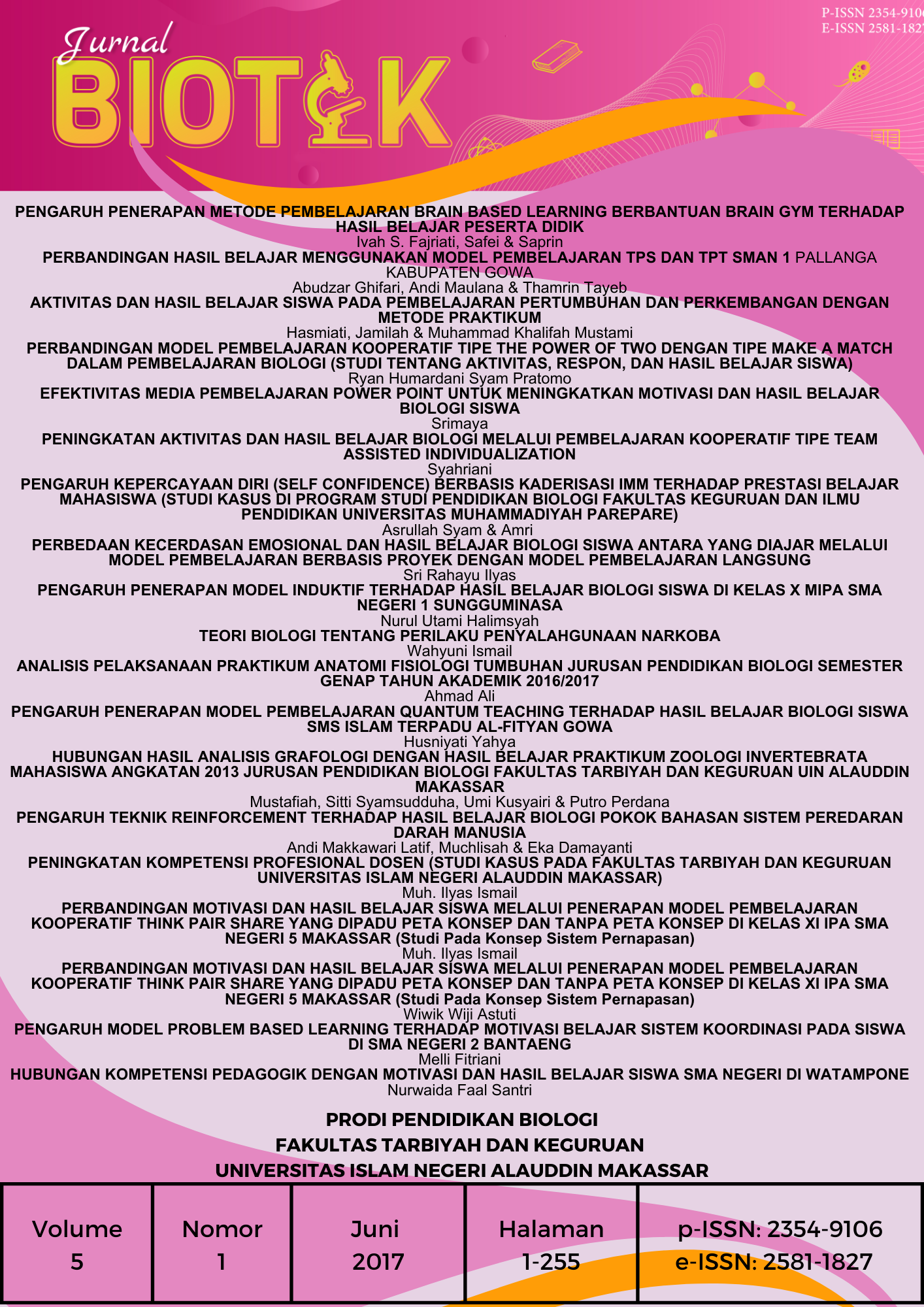PENGARUH KEPERCAYAAN DIRI (SELF CONFIDENCE) BERBASIS KADERISASI IMM TERHADAP PRESTASI BELAJAR MAHASISWA (STUDI KASUS DI PROGRAM STUDI PENDIDIKAN BIOLOGI FAKULTAS KEGURUAN DAN ILMU PENDIDIKAN UNIVERSITAS MUHAMMADIYAH PAREPARE)
Abstrak
This research has purpose to know and study self confidence based on Kadernisai IMM, learning achievement and self confidence based on Kadernisai IMM on student achievement of Biology Education Study Program Faculty of Teacher Training and Education of Universitas Muhammadiyah Parepare. This research is an associative quantitative research, but researchers do the treatment to collect data by distributing questionnaires, tests, structured interviews. Data collection methods used are Psychological Scale (self-confidence scale) IMM-based cadre and documentation. Research carried out by going through the stages of planning and implementation. Data analysis techniques used two types of analysis that is descriptive statistical analysis and inferential statistical analysis. Based on the results of research and discussion, self confidence based on IMM cadre of students in Biology Education Study Program Force 2014 is in enough category, student learning achievement in Biology Education Study Program Force 2014 is in the category of very satisfying while confidence (self confidence) Based on IMM cadre on the achievement of student learning in Biology Education Study Program Force 2014 Faculty of Teacher Training and Education of Universitas Muhammadiyah Parepare. Contribution of confidence variable (self confidence) based on IMM cadre of 94.1% while the remaining 6.6%.
##plugins.generic.usageStats.downloads##
Referensi
Tim Penulis. (2010). Al-Qur’an Al Karim. Surabaya: Toha Putera.
Azwar, S. (2008). Pengantar Psikologi Inteligensi. Yogyakarta: Pustaka pelajar.
Dariyo, A., dkk. (2007). Psikologi Perkembangan Anak Tiga Tahun Pertama. Cetakan I. Bandung: PT Refika Aditama.
Departemen Pendidikan Nasional. (2008). Kamus Besar Bahasa Indonesia. Cetakan IV. Jakarta: Gramedia Pustaka Utama.
Djamarah, S. B. (2002). Rahasia Sukses Belajar. Jakarta: PT Asdi Maha Satya.
Ghufron, M. N., & Risnawati, R. S. (2010). Teori-Teori Psikologi. Cetakan I. Yogyakarta: Ar-Ruzz Media.
Madya, W. G. (2001). Kiat Jitu Melawan Rasa Takut. Yogyakarta: Cemerlang Publishing.
Mitarwan. M. H. (2015). Peran IMM Fishum dalam Membangun Interaksi Sosial. Skripsi (tidak diterbitkan). Yokyakarta: Program Studi Sosiologi, Fakultas Ilmu Sosial dan Humaniora, Universitas Islam Negeri Sunan Kalijaga.
Hakim, T. (2002). Mengatasi Rasa Tidak Percaya Diri. Jakarta: Puspa Swara.
Komara, I. B. (2016). Hubungan antara Kepercayaan Diri dengan Prestasi Belajar dan Perencanaan Karir Siswa. Jurnal PSIKOPEDAGOGIA 2016. Vol. 5, No. 1 ISSN: 2301-6167. Jakarta: Universitas Ahmad Dahlan.
Iswidharmanjaya, A., & Agung, G. (2005). Satu Hari Menjadi Lebih Percaya Diri. Jakarta: PT. Elex Media Komputindo.
Krishna, A. (2006). Neo Psychic Awarenes. Jakarta: PT Gramedia Pustaka Utama.
Lauster, P. (2003). Tes Kepribadian (alih bahasa: D.H. Gulo). Jakarta: PT. Bumi Aksara.
Makmun, A. S. (2007). Psikologi Pendidikan. Cetakan 9. Bandung: Remaja Rosdakarya.
Mardatillah. (2010). Pengembangan Diri. STIE Balikpapan: Madani.
Mastuti, & Aswi. (2008). 50 Kiat Percaya Diri. Jakarta: PT. Buku Kita
Purwanto, N. (1990). Psikologi Pendidikan. Cetakan 5. Bandung: Remaja Rosdakarya.
Sugiyono. (2012). Metode Penelitian Kuantitatif, Kualitatif, dan R&D. Edisi Revisi. Cetakan 17: Bandung: Alfabeta.
Syah, M. (2008). Psikologi Belajar. Edisi Revisi 7. Jakarta: PT Raja Grafindo Persada.
Umar, H. (2008). Metode Penelitian untuk Skripsi dan Tesis Bisnis. Jakarta: Rajawali Pers.
Yudiantoro, E. (2006). Percaya Diri Itu Mudah. Cetakan I. Jakarta: Prestasi Pustaka.
Yulianto, F., & Nashori H. F. (2006). Kepercayaan Diri dan Prestasi Tae Kwon Do Daerah Istimewa Yogyakarta. Jurnal Psikologi Universitas Diponogoro Nomor 1 Tahun 3 2006, 55-62.
Authors who publish with Jurnal Biotek agree to the following terms: Authors retain the copyright and grant Universitas Islam Negeri Alauddin Makassar right of first publication with the work simultaneously licensed under a Creative Commons Attribution License (CC BY-SA 4.0) that allows others to share (copy and redistribute the material in any medium or format) and adapt (remix, transform, and build upon the material) the work for any purpose, even commercially with an acknowledgement of the work's authorship and initial publication in Universitas Islam Negeri Alauddin Makassar. Authors are able to enter into separate, additional contractual arrangements for the non-exclusive distribution of the journal's published version of the work (e.g., post it to an institutional repository or publish it in a book), with an acknowledgement of its initial publication in Universitas Islam Negeri Alauddin Makassar. Authors are permitted and encouraged to post their work online (e.g., in institutional repositories or on their website) prior to and during the submission process, as it can lead to productive exchanges, as well as earlier and greater citation of published work (See The Effect of Open Access).

This work is licensed under a Creative Commons Attribution-ShareAlike 4.0 International License.



